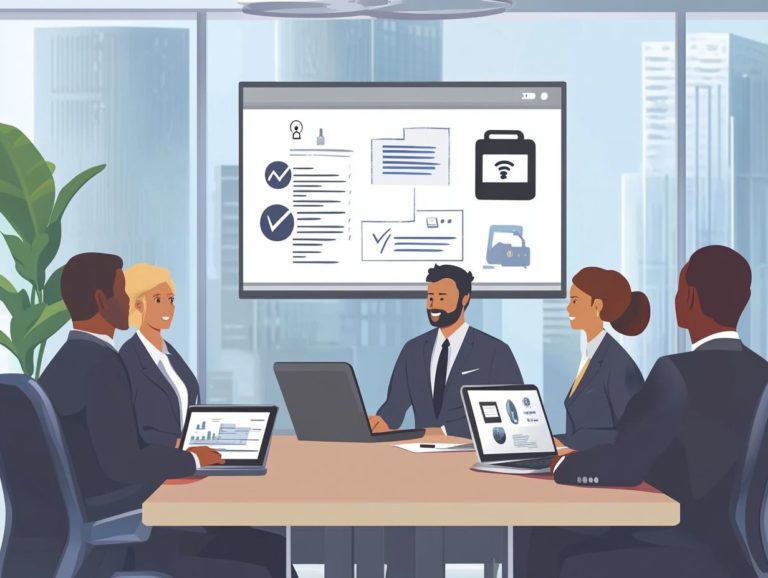5 compliance resources every business should use
In today s fast-paced business environment, ensuring compliance with regulations is more crucial than ever.
Navigating compliance may feel overwhelming, but it doesn t have to be. This article highlights five essential resources every business should use to meet regulatory standards and protect their interests.
From government websites and compliance training programs to industry associations and technology solutions, discover how these tools can empower your organization.
This discussion highlights the importance of compliance, the potential consequences of non-compliance, and the latest trends that can keep your business ahead of the curve.
Ready to equip yourself with the knowledge you need? Let s dive in!
Contents
- Key Takeaways:
- 1. Government Websites
- 2. Compliance Training Programs
- 3. Industry Associations and Organizations
- 4. Compliance Consultants
- 5. Software and Technology Solutions
- Wondering Why Compliance Matters?
- What Are the Consequences of Non-Compliance?
- How Can Businesses Stay Up-to-Date with Compliance Regulations?
- What Are the Key Components of an Effective Compliance Program?
- How Can Businesses Measure the Effectiveness of Their Compliance Efforts?
- What Are New Trends in Compliance and How Should Businesses Prepare?
- Frequently Asked Questions
Key Takeaways:

- Use government websites as reliable sources of compliance information and regulations.
- Invest in compliance training programs to educate employees and prevent costly mistakes.
- Join industry associations to stay updated on the latest compliance trends and best practices.
1. Government Websites
Government websites are vital as you navigate corporate compliance and business regulations. They provide essential information on laws like the Fair Labor Standards Act and Occupational Safety and Health Administration guidelines, ensuring you understand your legal obligations.
These agencies, such as the U.S. Department of Labor, offer compliance training and resources that help you maintain ethical practices. They provide guidelines that empower you to shape your operational strategies.
Understanding privacy laws is crucial. Resources detailing the California Consumer Privacy Act inform you of consumer rights, while the General Data Protection Regulation establishes a framework for managing personal data responsibly.
These online platforms serve not only as informational hubs but also as the backbone of corporate integrity for your business.
2. Compliance Training Programs
Compliance training programs align you with internal policies and standards. They ensure you are well-informed about workplace safety, risk management, and the ethical treatment of everyone in your organization.
These programs cover important topics, including:
- Harassment prevention
- Diversity and inclusion
- Data privacy
- Financial regulations
Each topic plays a crucial role in fostering a positive workplace culture and protecting employee rights. By participating in these training sessions, you not only meet legal obligations but also build trust among your colleagues.
To boost the effectiveness of these programs, compliance software is invaluable. It streamlines training, tracks completion rates, and provides easy access to essential information. This technology keeps you engaged and accountable, reinforcing your organization s commitment to ethical practices.
3. Industry Associations and Organizations
Industry associations are essential allies in corporate compliance. They provide invaluable resources, compliance programs, and updates that help you navigate business ethics and regulations.
These entities help establish best practices and foster environments where continuous education thrives. By joining organizations like the Society of Corporate Compliance and Ethics (SCCE) or the International Compliance Association (ICA), you access valuable training and networking opportunities.
These organizations facilitate employee resource groups, promoting collaboration and knowledge sharing among compliance professionals. Such networks enhance your skills and strengthen your organization s integrity and accountability.
Now that you have these resources at your disposal, explore them today and take your compliance efforts to the next level!
4. Compliance Consultants

Compliance consultants serve as essential allies for businesses like yours that are eager to navigate the complexities of legal obligations and craft robust compliance strategies.
They offer expert insights on compliance audits checks to ensure the business follows laws and regulations and ensure that you remain aligned with both federal laws and state regulations.
These professionals dive deep into the nuances of your organization s operations, identifying potential compliance issues that could pose risks.
By harnessing their extensive knowledge of regulatory frameworks, they help you formulate customized solutions tailored to the unique needs of your industry. Whether it s refining internal policies, organizing training sessions, or implementing effective monitoring systems, their comprehensive approach equips you with the necessary tools to adeptly manage and mitigate compliance challenges.
Partnering with these consultants helps your business build a culture of accountability while safeguarding your reputation and maintaining operational integrity.
5. Software and Technology Solutions
Software and technology solutions are revolutionizing the way you approach compliance. They offer sophisticated tools for data compliance, HR compliance, and the management of intricate business regulations in a streamlined and efficient manner.
With a range of compliance software available today, you have the opportunity to select tailored solutions that meet your specific needs. These platforms often come equipped with features such as automated risk assessments, tracking of regulatory changes, and real-time reporting, ensuring that your compliance efforts are not only documented but actively monitored.
By harnessing this technology, you can enhance transparency and accountability, making it easier to spot potential issues before they escalate. Integration with your existing systems allows for a seamless flow of information, ultimately leading to improved strategic decision-making and a stronger overall compliance position for your organization.
Wondering Why Compliance Matters?
Corporate compliance is vital for your business. It ensures that you adhere to federal and state regulations while cultivating a positive workplace culture, enhancing employee satisfaction, and upholding the highest ethical standards. This commitment ultimately paves the way for long-term success and sustainability.
Effective compliance management is crucial for shaping your organization s reputation. When you consistently meet regulatory requirements, customers and partners are more likely to see you as trustworthy and reliable.
Consider the fallout from compliance failures at companies like Enron and Volkswagen; they faced staggering financial penalties and irreparable damage to their reputations.
By implementing robust compliance practices, you can significantly mitigate risks, protecting your organization s assets and intellectual property. Prioritizing compliance not only shields your business but also improves employee retention, fostering loyalty among staff who value a transparent and ethical work environment.
What Are the Consequences of Non-Compliance?
The consequences of non-compliance can be quite severe for you, ranging from hefty fines and legal penalties to reputational damage and loss of financial resources. This makes effective risk management and adherence to legal obligations absolutely crucial for your business.
Companies that violate environmental regulations may face significant fines. For example, Pacific Gas and Electric was ordered to pay over $2 billion due to safety violations. Similarly, if financial institutions fail to comply with anti-money laundering laws, hefty penalties await them, as demonstrated by Deutsche Bank, which was fined nearly $630 million for such lapses.
These examples illustrate that negligence can result not only in financial repercussions but also in lingering distrust from consumers and investors.
To steer clear of these pitfalls, you should implement proactive compliance strategies, including:
- Regular audits
- Staff training
Ensuring your operations remain aligned with evolving regulatory requirements.
How Can Businesses Stay Up-to-Date with Compliance Regulations?

To remain in tune with compliance regulations, you must actively monitor updates from government agencies and industry news. This ensures you stay informed about any changes to laws and regulations that could impact your operations.
This proactive approach involves a variety of strategies, such as:
- Subscribing to regulatory newsletters that deliver timely updates straight to your inbox.
- Attending relevant webinars to deepen your understanding of complex compliance issues and engage with experts directly.
- Connecting with compliance professionals for personalized insights tailored to the specific nuances of your industry, making the learning process more effective.
- Leveraging technology tools that can streamline your information-gathering efforts. Sophisticated software is now available to track legislative changes and regulatory notifications, giving you the power to stay ahead of potential challenges and adapt swiftly.
What Are the Key Components of an Effective Compliance Program?
An effective compliance program has essential components: well-defined policies, training, regular audits, and a focus on ethics.
These elements create a culture of accountability in your organization. By establishing clear internal policies, you set the standard for expected behaviors, creating a roadmap for your employees.
Comprehensive training ensures that everyone understands these expectations, significantly reducing the chances of unintentional violations. Regular audits act as vital checkpoints, helping you identify areas for improvement.
A robust ethical foundation is critical for decision-making at every level, giving your employees the power to voice their concerns without fear of retaliation. Organizations like Google exemplify best practices by weaving compliance into their corporate culture.
Their ongoing workshops and open-door policies foster transparency and trust. This comprehensive approach not only mitigates risks but also upholds the integrity of your organization.
How Can Businesses Measure the Effectiveness of Their Compliance Efforts?
Measuring compliance effectiveness is crucial. Use audits, employee feedback, and software to check adherence to policies.
Various important metrics become crucial, ranging from tracking the number of compliance violations to monitoring the completion rates of training programs. These indicators provide insights into how well your team grasps compliance requirements.
Establish regular feedback loops to gather insights from employees, fostering a culture of accountability and continuous development. This process ensures adherence to existing regulations and allows for proactive adjustments to your compliance management strategies.
Ultimately, this enhances overall organizational performance and reduces risks.
What Are New Trends in Compliance and How Should Businesses Prepare?
Emerging trends in compliance, such as heightened data governance and evolving privacy policies, demand that you adapt your compliance management practices.
Implement proactive risk management strategies to stay compliant in this ever-changing regulatory landscape. Consider the implications of a distributed workforce as you navigate complex data privacy regulations like GDPR and CCPA.
The rise of remote work presents new challenges for safeguarding sensitive information. It’s vital for your organization to establish clear policies and leverage robust technology solutions.
Flexibility is key, enabling you to pivot your strategies swiftly in response to new regulations or emerging risks. Create a dynamic culture of compliance! This not only fulfills legal obligations but also builds trust with your clients.
Frequently Asked Questions

What are the 5 compliance resources every business should use?
Every business needs five key tools: compliance software, consultants, training, manuals, and checklists. These resources help ensure you’re following laws and regulations.
Why is it important for businesses to use compliance resources?
Compliance resources help businesses follow laws and avoid legal problems. They also build trust with customers and stakeholders.
What is compliance software?
This software helps businesses manage their compliance efforts. It automates tasks, monitors regulations in real-time, and generates reports.
How can compliance consultants help businesses?
Compliance consultants are experts who guide businesses in creating compliance programs. They can conduct audits and suggest improvements.
What is the purpose of compliance training?
Compliance training educates employees on regulations and company policies. It clarifies their responsibilities and prevents violations.
What is a compliance manual?
A compliance manual details a company’s policies for meeting regulations. It serves as a guide and reference for employees during audits or training.






